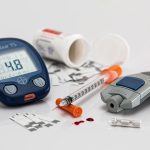By Dr Jean Strelitz, MRC Postdoctoral Fellow, MRC Epidemiology Unit People with type 2 diabetes have a higher risk of heart disease and premature death. People with type 2 diabetes […]
Type 2 diabetes weight loss recommendations could be harmful for some, depending on BMI
In this article for The Conversation, Dr Jean Strelitz discuss research showing how advising weight loss to all people with type 2 diabetes may not be the best approach. People […]
Type 2 diabetes remission possible with ‘achievable’ weight loss
People who achieve weight loss of 10% or more in the first five years following diagnosis with type 2 diabetes have the greatest chance of seeing their disease go into […]
Type 2 diabetes: small reduction in alcohol, big reduction in heart disease risk
Jean Strelitz writes about new research which indicates that reducing alcohol use by as little as two units per week may have long-term health benefits for people with diabetes. This […]
Patients with an ‘empathic’ GP at reduced risk of early death
Patients who have been diagnosed with diabetes are at a lower risk of early death if they have a doctor who they describe as showing empathy towards them, a new […]
Type 2 diabetes: losing even a small amount of weight may lower heart disease risk
People with type 2 diabetes are often encouraged to lose weight. And recent studies have shown that losing a lot of weight can reverse diabetes, meaning the person no longer […]
Large studies find screening reduces mortality for those with detectable type 2 diabetes but not for general population
Three large trials published today involving researchers from the MRC Epidemiology Unit show that screening for type 2 diabetes and cardiovascular risk factors may not reduce mortality and cardiovascular disease […]
Genetic approach could help identify side-effects at early stages of drug development
An approach that could reduce the chances of drugs failing during the later stages of clinical trials has been demonstrated by a collaboration between the University of Cambridge and pharmaceutical […]
Early detection and treatment of type 2 diabetes may reduce heart disease and mortality
Screening to identify type 2 diabetes followed by early treatment could result in substantial health benefits, according to new research published today in Diabetes Care that combined large scale clinical […]
ADDITION Study research wins BMJ ‘Research Paper of the Year’ Award
Research led by Prof Simon Griffin and Dr Rebecca Simmons at the MRC Epidemiology Unit has won the British Medical Journal’s award for ‘Research Paper of the Year’ 2013. Professor […]

 MRC Epidemiology Unit
MRC Epidemiology Unit






